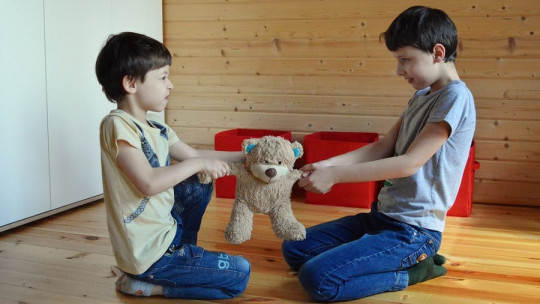
Jealousy between siblings can appear as a competition to receive more attention or parental care and thus attract more attention.
The bonds we generate with our siblings constitute a fundamental part of the family experience, and in many cases, have their roots in child development and care. Often, challenges arise that threaten harmony between siblings. One of the most recurring challenges is the appearance of jealousy between siblings, a reality that many families face at different times and situations during their upbringing.
Understanding the origins and consequences of this jealousy is crucial to effectively address it and promote healthy relationships within the home. At a time when the demands of work and everyday responsibilities often absorb parents’ attention, children may feel displaced or neglected, triggering feelings of envy and sibling rivalry. Competition for parental attention thus generates conflicts and tensions.
The impact of sibling jealousy extends beyond the relationship between children and can affect family dynamics as a whole. Parents may feel overwhelmed by the constant conflicts between their children and may experience feelings of guilt or helplessness at not being able to resolve the problem. Additionally, jealousy between siblings can create additional tensions in the family and contribute to an overall environment of stress and discord.
In this context, it is imperative to explore effective strategies to prevent and address jealousy between siblings, with the aim of promoting healthy family relationships and a mutually supportive environment within the home. Therefore, in this article, we will understand jealousy between siblings in a deeper way and we will propose different strategies to prevent the appearance of these situations and emotions in family dynamics.
Understanding jealousy between siblings
Jealousy between siblings is a common experience in many families and can arise for a diverse variety of reasons. This type of jealousy between siblings usually appears when one of the siblings feels that the other receives more attention or care from parents or caregivers. Generally, jealousy between siblings generates attention-seeking behavior towards parents and caregivers and aggressiveness towards the rest of the siblings.
It is important to understand the nature of sibling jealousy in order to effectively address it and promote healthy relationships within the family. At its core, sibling jealousy is a natural emotional response to perceived competition for affection, attention, or resources from parents or caregivers. Children may feel threatened when they perceive that one of their siblings is receiving more attention or praise, which can trigger feelings of inferiority, resentment, or envy.
Comparison between siblings can also contribute to jealousy. Children can constantly compare themselves to each other in terms of academic achievements, sports skills, social popularity, etc. This can create a sense of rivalry and breed resentment if a sibling is perceived as more successful or favored. Additionally, jealousy between siblings can intensify if parents do not adequately address conflicts or if they show favoritism toward one of the children. Children are sensitive to any sign of unequal treatment and may interpret it as an indication that they are not loved or valued in the same way.
Causes of jealousy between siblings
Sibling jealousy, a phenomenon that can cause significant tensions in family dynamics, has deep roots in various causes that arise from the interactions and relationships between family members.
1. Competition for parental and caregiver care
A primary cause of jealousy between siblings is competition for the attention of parents or caregivers. Children, especially in their earliest stages of development, have an inherent need to feel loved and valued. When they perceive that one of their siblings receives more time, affection, or praise from their parents, they may experience feelings of insecurity and displacement. This type of rivalry can intensify in situations where parents have multiple children and need to divide their attention between them.
2. Constant comparison
Constant comparison between siblings can also be a significant cause of jealousy. Children are often compared in terms of academic achievement, sports skills, behavior, and other aspects of their lives. This comparison can lead to rivalry and resentment, especially if one sibling is perceived as more talented or successful than the other. Constant comparisons can create an atmosphere of competition at home instead of fostering collaboration and mutual support between siblings.
3. Unequal parental treatment
Additionally, unequal treatment by parents can fuel jealousy between siblings. When one child perceives that another is receiving preferential or more lenient treatment, feelings of injustice and envy are likely to arise. Perceived favoritism can undermine the self-confidence of the child who feels disadvantaged and undermine the sibling relationship, creating additional tensions in the family.
The impact of jealousy between siblings
Sibling jealousy can have a significant impact on family dynamics and the emotional development of the children involved. It is crucial to understand how this jealousy can affect children and the family as a whole in order to properly address this challenge.
1. Relational deterioration between siblings
One of the most obvious impacts of sibling jealousy is the deterioration of the relationship between the siblings themselves. Feelings of envy, resentment and competition can create a tense and hostile environment between siblings, making communication and collaboration difficult. Instead of building strong, supportive relationships, jealousy can lead to constant conflict and lasting resentment.
2. Self-esteem and well-being
Additionally, sibling jealousy can affect the self-esteem and emotional well-being of the children involved. Children who experience jealousy may develop feelings of inferiority, insecurity, and negative self-concept. This can have long-term repercussions on your mental health and your ability to form healthy relationships in the future.
3. Impact on family dynamics
Family dynamics can also be impacted by jealousy between siblings. Parents may feel overwhelmed by the constant conflicts between their children and may experience feelings of guilt or helplessness at not being able to resolve the problem. Besides, Jealousy between siblings can create additional tensions in the family and contribute to an overall environment of stress and discord.
4. Serious behavioral problems
In some cases, sibling jealousy can even lead to more serious behavioral problems, such as physical or emotional aggression, mood disorders, or adjustment problems in school or other social settings.
Strategies to prevent jealousy between siblings
Fortunately, there are several strategies that parents and caregivers can implement to prevent and address jealousy between siblings, thus promoting healthier and more harmonious relationships in the family.
1. Open and honest communication
One of the most important strategies is to encourage open and honest communication at home. Parents should encourage their children to express their feelings and concerns s, even when it comes to jealousy between siblings. Providing a safe space for children to share their emotions can help resolve conflict constructively and promote empathy between siblings.
2. Celebration of individual differences
In addition, it is essential to celebrate the individual differences between children and recognize and value the unique strengths of each one. Parents can encourage their children to develop individual interests and hobbies, allowing them to excel in areas that are important to them. Recognizing and praising each child’s achievements can help reduce feelings of competition and envy among siblings.
3. Assignment of equitable responsibilities
Assigning equal responsibilities within the home can also help prevent jealousy between siblings. Parents can ensure that each child has tasks and responsibilities appropriate to her age and abilities, thus avoiding the perception of unequal treatment. This also fosters a sense of collaboration and teamwork between siblings, rather than competition.
4. Individual quality time
Spending quality time with each child individually is also essential. Parents can set aside special moments to be alone with each of their children, giving them exclusive attention and affection. This allows children to feel valued and loved individually, thereby reducing jealousy that can arise from perceived lack of attention.
5. Modeling positive behaviors
Additionally, parents can model positive behaviors and conflict resolution skills for their children. Showing mutual respect, effective communication, and proper emotion management can help children learn to manage conflict constructively and to develop healthy relationships with each other.
Conclusions
In conclusion, jealousy between siblings is common but can be effectively addressed with appropriate strategies. By recognizing the causes, understanding their impact, and taking preventive measures, parents can promote healthier family relationships. Encouraging open communication, celebrating individual differences, and assigning equal responsibilities are key steps. Additionally, spending quality time with each child and modeling positive behaviors are essential. By actively working to prevent and resolve jealousy between siblings, you strengthen the family bond and promote an environment of support and harmony within the home.








